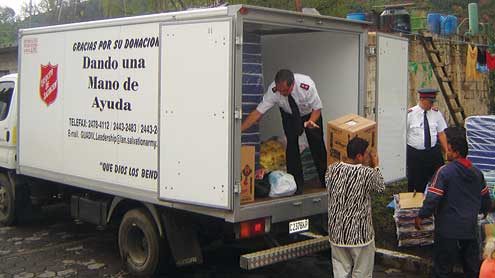Army acts as El Salvador, India hit by deadly temblors
In the aftermath of two deadly earthquakes that rocked El Salvador and India, Salvation Army relief workers are providing assistance to the living and comfort to the families of those who perished.
In the western India state of Gujarat, more than 25,000 were killed and tens of thousands injured after a 7.9 earthquake hit near Bhuj on January 26.
According to Indian government officials, the number of dead and missing may hit 100,000. Damage is estimated to be $5.5 billion.
The USA Western Territory has wired $100,000 to help fund the Army’ disaster response efforts in western India. Inter-national Emergency Services Coordinator Major Mike Olsen estimates the initial phase of The Salvation Army’s medical response will cost approximately $500,000.
Major Ted Mahr, a Western Territory officer who serves as executive secretary for The Salvation Army Health and Social Services advisory council in India, reports that the Army has sent medical teams and supplies to Gujarat.
“The Ahmedabad Central Corps has opened its grounds for people to have a place to sleep and eat,” he said. “Many whose homes have not collapsed are afraid to go into them because of the strong aftershocks still hitting the area.” Ahmedabad is only 250 miles from the quake’s epicenter.
Mahr says that a medical team of 13 persons from Emery Hospital, Anand, including two medical doctors, four nurses and seven technical assistants, are enroute to Rajkot, near Bhuj, where they have been allotted villages to provide emergency medical care. They took medicines and supplies worth about $1,300, a significant amount for their hospital to spend, and will need more supplies soon. “This may well rapidly develop into a response in a wider scope of actions than just medical,” Mahr said.
One thousand tents are en route to The Salvation Army sites. Five hundred will come from neighboring Pakistan through the support of Territorial Commander Commissioner Shaw Clifton. The rest will come from area vendors. The Territorial Command for Bangladesh is shipping a large supply of sweaters for distribution to survivors.
Major Roslyn Mahr, administrator of the Evangeline Booth Hospital in Ahmednagar, reports no damage to their facility or personnel.
Historically, Christians have been persecuted in India, especially in this region. This has caused difficulty for Christian organizations attempting to provide relief work. According to P.G. Vargis, of the Christian organization Indian Evangelical Team, there has been a rise of anti-Christian persecution in the state of Gujarat, and Ahmedabad in particular, by Hindu radicals. “Pray for the people of this city where so many of God’s servants have been beaten, churches demolished, and some missionaries even murdered,” says Vargis.
El Salvador
In El Salvador, Salvation Army relief work continues more than two weeks after a 7.6 earthquake killed 726, injured 4,440 and damaged or destroyed more than 190,000 homes. The worst damage was suffered in Santa Tecla, 10 miles west of the capital, San Salvador. There, The Salvation Army is providing much-needed food and shelter to survivors. More than 110 soldiers and staff volunteers are assisting with Army work.
In addition, the Army erected a large open-sided tent as a clinic, utilizing local volunteer doctors. The main medical problems now being addressed are gastrointestinal distress and dehydration. As well as providing for people’s immediate physical needs, staff conduct children’s meetings and activities daily and community meetings under the trees at night.
In the cities of Usulutan, Gualache, Ozlatan and Santiago de Maria, The Salvation Army is providing 18,000 meals per day. This is expected to increase to nearly 30,000 meals per day in response to requests from local government.












